By Andrew Warshaw, chief correspondent
April 19 – A year after the most blood-letting and bitter summit in its history, a detailed report into serious financial mismanagement within CONCACAF will be presented to members at their Congress in Panama today.
Warner, former FIFA vice-president and still a minister in the government of Trinidad and Tobago, stood down from all his footballing positions rather than face a FIFA Ethics Commission inquiry relating to bribery allegations surrounding the FIFA presidential election.
FIFA president Sepp Blatter will attend today’s Panama congress along with his number two, Jerome Valcke, and delegates from 40 member nations.
CONCACAF’s executive committee met on Thursday for five hours of deliberations but declined to reveal details of the report which is expected to outline explosive financial malpractice.
At the centre of the probe is a claim, sensationally revealed at last year’s CONCACAF Congress in Budapest attended by InsideWorldFootball, that the $22.5 million Joao Havelange Centre of Excellence in Trinidad was not owned by CONCACAF, as all its members had assumed, but – secretly – by two companies owned by Warner.
Astonishing evidence of the tangled financial state of CONCACAF under the Warner/Blazer regime prompted fury among delegates in Budapest. It included CONCACAF allegedly concealing tax liabilities to the US Inland Revenue Service between 2007 and 2011 to the tune of millions of dollars.
Delegates launched a scathing attack on the past regime as a day that was supposed to be all about Webb being elected as President was completely overshadowed by revelations of tax evasion and misappropriation of funds. Cuban Federation President Luis Hernandez told Webb at the time he was “sitting on a time bomb”.
“It’s bad, it’s very bad,” one delegate told Reuters after Thursday’s executive committee meeting, 24 hours ahead the Congress where United States Soccer Federation boss Sunil Gulati goes head to head with his Mexican counterpart, Justino Compean to replace Blazer on FIFA’s all-powerful executive committee.
The larger than life Blazer was the original whistle-blower who exposed the cash-for-votes scandal that led to a string of sanctions among Caribbean members. He finally stepped down from CONCACAF last December – with his place at the top table of FIFA up for grabs.
To add further intrigue to an already complex situation, the FBI has been examining more than $500,000 in payments made by the Caribbean Football Union (CFU) over the past 20 years to an offshore company headed by Blazer during a time when Warner was also head of the CFU, a position he held from the early 1980s until 2011. The precise reasons for many of those payments is unclear.
The square-off between Gulati, who has run the game in the US since 2006, and Compean promises to be a close affair, dubbed by the Mexican media as a “Clásico personal”.
Some sources believe that having worked previously with Blazer and coming from the same country will work against Gulati since a vast majority of CONCACAF members are from the Caribbean bloc that seems likely to determine the outcome of the ballot. However, in a letter sent by the Caribbean Football Union (CFU) president Gordon Derrick to CFU voting members (a copy of which was provided to InsideWorldFootball), endorsement was given to Gulati and no mention was made of his rival Compean.
Webb has no vote but holds considerable sway as, of course, does Blatter who holds Gulati – understood to have been nominated by four of the five countries in his part of the region – in high esteem.
The FIFA president is widely believed to have voted for the United States to stage the 2022 World Cup – a campaign led by Gulati which ultimately failed as Qatar won hands down.
Also in Gulati’s favour is that he is a member of Independent Governance Committee charged with drawing up the reform proposals that will be presented to FIFA’s Congress in Mauritius next month. One source told InsideWorldFootball that Gulati could end up winning by as many as 25 votes, but there is a chance that festering resentment in the Caribbean could ultimately work against him.
Contact the writer of this story at moc.l1745341726labto1745341726ofdlr1745341726owedi1745341726sni@w1745341726ahsra1745341726w.wer1745341726dna1745341726

